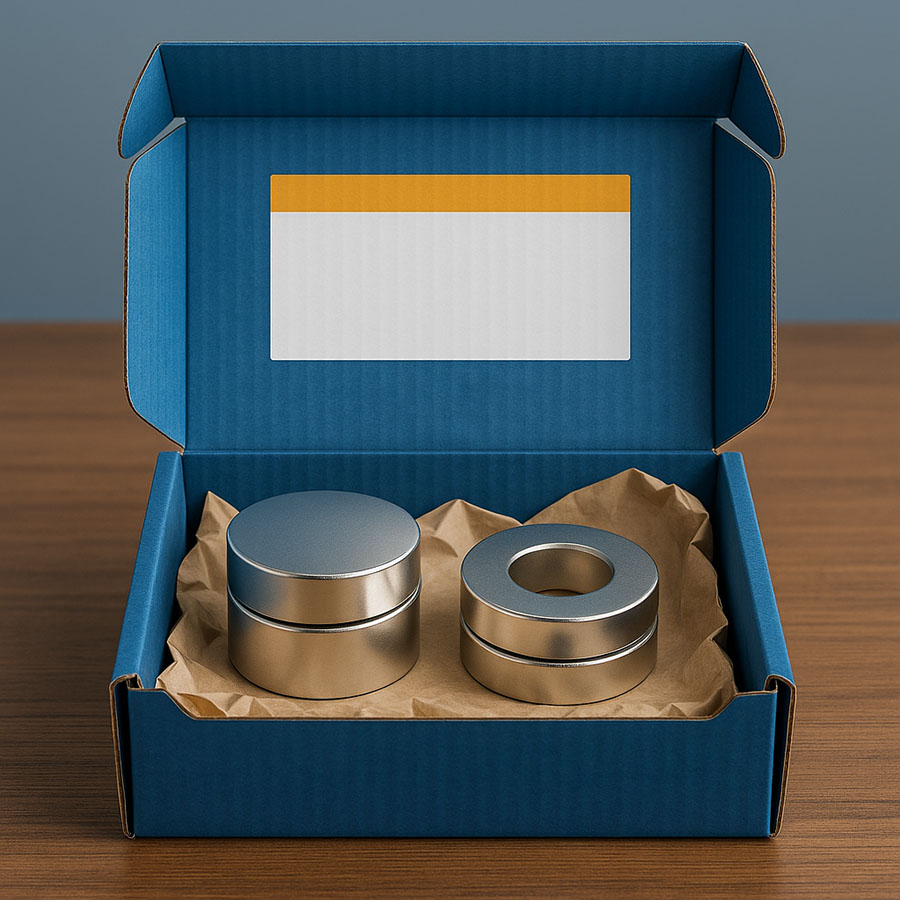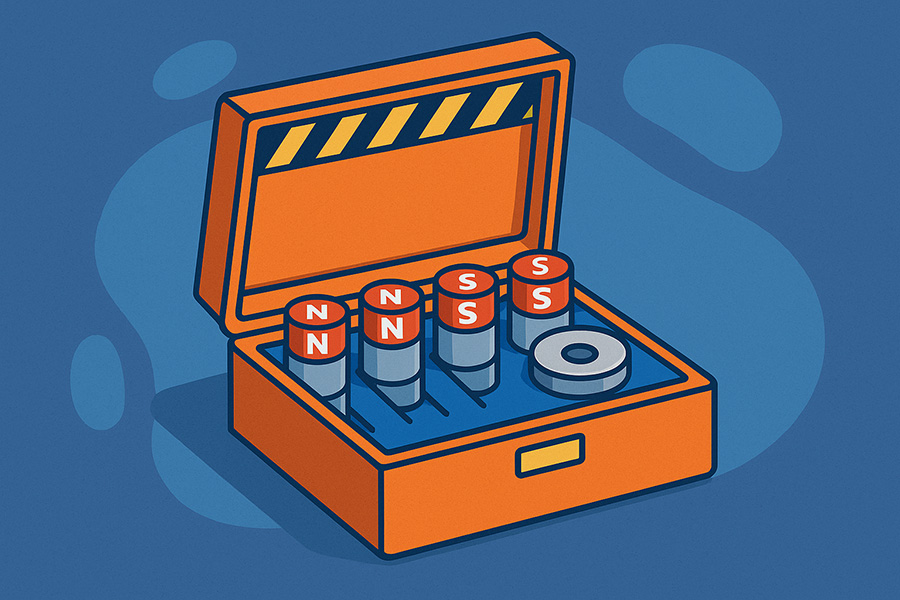Just bought your first neodymium magnets?
Neodymium magnets pack way more power than regular fridge magnets.
- Their strength makes them risky if mishandled, and they can break or rust if not stored right.
- How you store them matters.
- Good storage keeps their strength intact and protects your electronics and other items.
Let’s walk through everything you need to know about storing neodymium magnets safely.
Table of Contents
Understanding Safety Concerns First
Before diving into storage techniques, let’s talk about the risks of strong neodymium magnets:
Pinching and Impact Injuries
Strong magnets snap together faster than you can react. If your fingers get caught between them, it hurts – a lot.
Large neodymium magnets can hit with enough force to break bones or cut off blood flow to fingers. Always handle them with respect and keep your body parts away from the “pinch zone.”
For larger magnets, wear heavy gloves for protection. Keep your hands at least 1-2 inches from the edges when carrying them.
Shattering and Flying Fragments
These magnets are strong but brittle. They can chip or shatter when they slam together or hit something hard. Broken pieces can fly at high speed and hurt your eyes.
Always wear safety glasses when handling large magnets. If one breaks, the fragments are sharp like broken glass. Use gloves to clean up and store the pieces in a container.
Child Safety and Ingestion Hazard
Keep magnets away from kids at all times. If a child swallows more than one magnet, they can attract each other through intestinal walls and cause serious internal damage.
Many children have needed emergency surgery after swallowing small high-powered magnets. Store them in locked areas if kids are around. Never treat neodymium magnets as toys – even small ones like magnet spheres or cubes.
Protecting Your Magnet’s Strength
Use Magnetic Keepers
A magnetic keeper is just a small piece of ferromagnetic metal that bridges the poles of your magnet.
Place the keeper across the poles of bar magnets when not using them. This simple step helps preserve the magnetic field.
No keeper? No problem. Store bar magnets in pairs with opposite poles facing each other. This creates a closed magnetic circuit that helps maintain strength.
For older magnets like Alnico, keepers are essential to prevent strength loss.
Neodymium magnets don’t typically need keepers, but using a steel one can contain the magnetic field and make storage safer.
Stack Similar Magnets Together
For disk, block, or ring magnets, stack them directly on top of each other. This aligns their fields in the same direction.

When properly stacked, magnets effectively “hold hands” and maintain strength. Store them so opposite poles are next to each other (North near South), letting the magnetic field form a closed loop.
Be careful when stacking strong neodymium magnets. They can snap together hard enough to chip or break. Always use protective spacers between powerful magnets.
Use Different Storage Methods for Different Shapes
Bar Magnets: Use keepers across the poles or store in attractive pairs with opposite poles facing each other.
Disk Magnets: Stack them where they naturally attract each other. This usually means alternating pole orientation.
Block Magnets: Store with a thick piece of iron or steel connecting their north and south poles to reduce the external magnetic field.
Ring Magnets: Stack with consistent orientation or use a steel rod through the center to create a closed magnetic circuit.
Avoiding External Interferences
Keep Away From Strong Electrical Equipment
Large motors and electrical equipment create their own magnetic fields that can mess with your magnets over time.
Store your magnets at least a few feet away from:
- Power tools
- Large motors
- High-powered electrical equipment
- Industrial magnets or electromagnets
If you must store magnets near such equipment, use shielding materials like steel enclosures to reduce the effect of external fields.
Protect Your Electronics and Data
Your magnets can harm sensitive electronics and erase data. A neodymium magnet too close to magnetic media can wipe out data completely.
Keep magnets away from:
- Laptops and computers (at least 2-3 feet away)
- Hard drives (at least 3 feet for strong magnets)
- Credit cards with magnetic strips
- Smartphones and tablets
- Key fobs and ID badges
- Smart watches
- Older magnetic media (VHS tapes, cassettes)
Remember that distance helps. A magnet’s strength drops quickly as you move away from it. For very strong neodymium magnets, keep them at least several feet away from sensitive electronics.
Medical Device Safety
Magnets can interfere with medical devices like pacemakers, insulin pumps, or hearing aids. The strong magnetic field from a neodymium magnet may cause a pacemaker to malfunction or switch modes.
Store magnets where people with pacemakers won’t accidentally get too close. Clearly warn household members if you have strong magnets in storage.
Keep powerful magnets at least 6 inches (15 cm) away from anyone with a pacemaker – though staying several feet away is safer.
Other Environmental Hazards
Be aware of these risks too:
- Strong magnets can suddenly pull in metal objects like wrenches or knives from a distance
- Keep magnets away from flammable gases, as colliding magnets might create sparks
- Never store magnets near gasoline, propane, or other explosive materials
- Choose a storage spot with low foot traffic, away from vulnerable people and devices
Managing Environmental Factors
Control Temperature
Heat kills magnetic strength. All magnets have a Curie temperature—the point where they lose magnetization.
Most standard neodymium magnets start to permanently lose strength above 80°C (175°F). If they get even hotter, they can become completely demagnetized.
Even lower temperatures can cause gradual weakening over time. Keep them away from heat sources like:
- Ovens
- Space heaters
- Direct sunlight in a hot room
- Attics or car trunks in summer (temperatures can soar above safe levels)
- Near radiators or heating vents
Store your magnets in cool, stable places. Avoid spots with big temperature swings.
Ideal temperature range: 50°F to 85°F (10°C to 30°C). Room temperature (around 20°C/68°F) works best for maintaining performance.
Cold temperatures generally don’t permanently harm neodymium magnets, but extreme cold or rapid temperature changes could make them more brittle.
Prevent Moisture Damage
Neodymium magnets contain iron, which means they can rust if exposed to moisture.
Most have a protective coating (like nickel, zinc, or epoxy), but if that coating gets damaged, the magnet can start to corrode.
Corrosion weakens magnets and can make them fall apart over time.
Always store magnets in a dry environment.
Avoid damp locations like humid basements.
Storage humidity recommendations:
- Ideal relative humidity: Below 50%
- Danger zone: Above 60% relative humidity
- Critical: Never expose to direct water or condensation
Store your magnets in a dry place.
If you live somewhere humid, consider:
- Sealed containers with rubber gaskets
- Adding silica gel packets (desiccants) – replace them every few months
- Climate-controlled storage areas
- Applying a thin coat of light oil as a temporary moisture barrier for uncoated magnets
- For long-term storage, vacuum-sealed bags with desiccant
Before storing magnets, make sure both the magnets and their packaging are completely dry.
Check your magnets regularly for signs of corrosion. A reddish-brown color or flaking means rust. If you notice any scratches or chips in the plating, be extra careful about moisture protection.
Ensuring Physical Safety
Prevent Uncontrolled Attraction
Strong magnets can snap together with surprising force. This can cause:
- Chips in the magnet
- Complete breakage
- Pinched fingers
- Flying fragments that can injure eyes
Store different magnets in separate compartments. Use non-magnetic dividers made of plastic, cardboard, or wood. For large or very strong magnets, thick spacers are essential.
Practical safety measures:
- For magnets under 1 inch: Keep at least 1/4 inch spacing between magnets
- For magnets 1-2 inches: Use at least 1/2 inch thick dividers
- For magnets over 2 inches: Use dividers at least 1 inch thick
- Always make dividers from non-magnetic materials (plastic, wood, cardboard)
Neodymium magnets can “jump” into contact from surprisingly far distances. A coin-sized neodymium magnet can leap several inches to a piece of iron. Larger ones can move several feet if powerful enough.
Proximity guidelines:
- Small magnets (under 1/2 inch): Keep at least 3-4 inches from metal objects
- Medium magnets (1/2 to 1 inch): At least 6-8 inches from metal
- Large magnets (over 1 inch): Maintain 1-2 feet clearance from metal objects
- Very large magnets: May require several feet of clearance
Keep a clear “no metal zone” around stored neodymium magnets.
Keep Things Clean
Before storing magnets, make sure they’re clean. Neodymium magnets attract iron filings or tiny metal particles. These particles can damage the magnet’s coating and encourage corrosion.
Storage cleanliness tips:
- Wipe magnets with a microfiber cloth before storage
- Use compressed air to blow off stubborn metal filings
- For very dirty magnets, use masking tape to lift off metal particles
- Never soak neodymium magnets in water to clean them
- If necessary, use a small amount of alcohol on a cloth (then dry immediately)
Store magnets in a dust-free environment and closed container. Wipe off any metal powder or dirt before putting magnets away.
If a magnet has collected metal debris, use a thick glove or cloth to carefully wipe it off (be cautious—metal slivers can be sharp).
Handle With Care
Treat magnets like fragile glass items. Mechanical shock can slightly weaken a magnet. Dropping a magnet or banging it against a hard surface can knock some of the microscopic magnetic domains out of alignment.
Safe handling techniques:
- Always use two hands for larger magnets
- Place a cloth or foam pad on your work surface when handling magnets
- For very strong magnets, work over a soft surface like a carpeted floor
- Never toss or drop magnets, even onto soft surfaces
- If a magnet is stuck to metal, slide it off rather than prying or pulling
When removing magnets from storage, do so gently.
Slide magnets apart laterally instead of pulling directly. This overcomes their attraction in a controlled way.
Storing Different Types of Magnets
Neodymium (NdFeB) Magnets
These are likely what you have if you bought strong magnets recently. They’re extremely strong but vulnerable to chipping, breaking, and corrosion.
Special care tips:
- Always check the coating for damage (look for scratches, dull spots, or exposed metal)
- Store in pairs or stacks with opposite poles facing
- Use steel keepers to contain the magnetic field
- Keep extremely dry (below 50% relative humidity)
- Handle with care to prevent chipping
- Assume a neodymium magnet is stronger than it looks
- For very large neodymium magnets, treat them almost like a dangerous power tool
- Never allow direct magnet-to-magnet impacts
- Store in thick, secure enclosures for larger magnets
- Use eye protection when handling multiple strong magnets
Strength preservation facts:
- Neodymium magnets typically lose less than 1% of their strength per decade under proper storage
- Poor storage conditions can accelerate this loss significantly
- A magnet stored at constant room temperature will last longer than one exposed to temperature swings
- Once magnetism is lost due to heat exposure, it cannot be restored without specialized equipment
Coating protection:
- Most neodymium magnets have a triple-layer nickel-copper-nickel plating
- Some have zinc, gold, or epoxy resin coatings instead
- The coating thickness is typically only 10-30 microns (very thin)
- Even minor scratches can create entry points for moisture
Other Common Magnet Types
Samarium Cobalt (SmCo)
Known for high-temperature stability and corrosion resistance. Can withstand temperatures up to 300°C (572°F) without demagnetization. More expensive than neodymium but better for high-temperature applications. Still, stack them carefully or use keepers to maintain magnetization and reduce breakage risks.
Ferrite (Ceramic)
More brittle and weaker than neodymium but less prone to corrosion. Can withstand temperatures up to 250°C (482°F). No special coating needed as they resist corrosion naturally. Store in pairs with keepers or stacked. Beware of chipping if they slam together.
Alnico Magnets
Often used in older or specialized applications like musical instruments or vintage equipment. More temperature resistant (up to 450°C/842°F) but much more prone to demagnetization from external magnetic fields. Alnico magnets are prone to partial demagnetization if stored without keepers. Always use steel keepers for bar and horseshoe alnico magnets to close the magnetic circuit.
Long-Term Storage Solutions
Create a Dedicated Storage System
For your magnet collection, consider:
- Rigid containers with individual compartments (at least 1/4 inch thick walls)
- Foam inserts that hold magnets securely (closed-cell foam works best)
- Wooden boxes with non-magnetic dividers (1/2 inch thick for stronger magnets)
- Metal tins with internal padding for shielding (at least 1/4 inch of padding)
- Double-layer boxes (one box inside another) with padding between layers
- Plastic tackle boxes or fishing lure boxes work well for small magnets
- Ammo boxes with foam inserts for larger magnets
For long-term storage (months to years), you’ll need:
- Sealed containers with rust inhibitors like VCI (Volatile Corrosion Inhibitor) paper
- Clear labeling for future handlers with strength warnings
- Desiccant packets that change color when saturated with moisture
- Storage in a climate-controlled environment at constant temperature
- Periodic inspection schedule (mark calendar for every 3-6 months)
DIY storage options:
- Egg cartons work well for small disc magnets (separate with thin cardboard)
- Plastic pill organizers for tiny magnets (label each compartment)
- Tool organizers with small drawers (line with non-magnetic material)
- 3D-printed custom holders (if you have access to a printer)
Safety First: Quick Tips
- Never let children play with strong magnets—even small ones can cause serious injury if swallowed
- Wear eye protection when handling multiple strong magnets (standard safety glasses are sufficient)
- Keep magnets at least 6 inches (15 cm) away from anyone with implanted medical devices
- Maintain a “safe distance” or place magnets in clearly separated compartments
- For magnets over 1 inch in size, consider using heavy work gloves when handling
- Wash hands after handling neodymium magnets (the nickel coating can cause allergic reactions in some people)
- Count magnets before putting them away to ensure none are missing
- Slide magnets apart laterally instead of pulling directly
- Never “test” the strength of large magnets by letting them snap together
- Remove all jewelry (rings, watches) when handling strong magnets
- Keep a magnet first-aid kit: tweezers (non-magnetic), gloves, eye protection, and bandages
- If working with large magnets, have a helper present
Conclusion
Proper storage extends your magnets’ life while protecting your belongings and keeping everyone safe.
When stored properly, neodymium magnets will keep over 99% of their strength for decades, losing only a tiny fraction of magnetization over time.
Remember:
- The strongest magnets deserve the most careful storage.
- A little effort now will keep your magnets powerful and safe for years.
Need premium neodymium magnets tailored made to your specifications?
Send us an email by filling the contact form.


